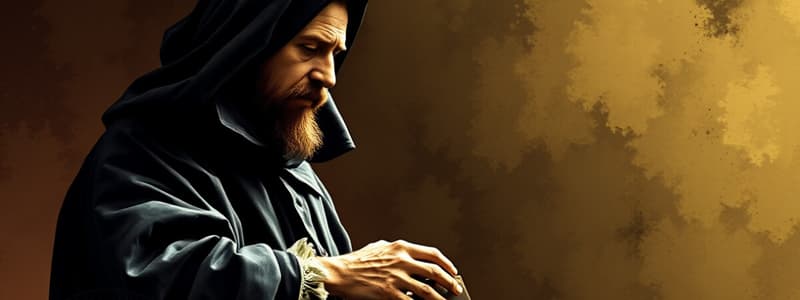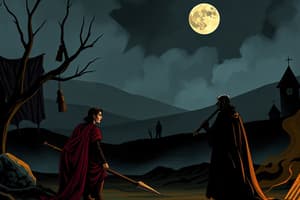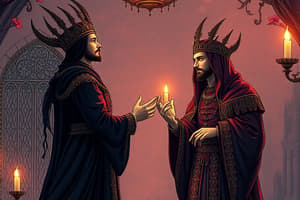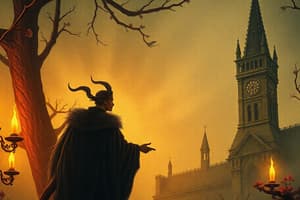Podcast
Questions and Answers
What is the significance of the phrase 'Fair is foul, and foul is fair' chanted by the witches?
What is the significance of the phrase 'Fair is foul, and foul is fair' chanted by the witches?
It represents a paradox theme and suggests that there is no moral order.
What does Macbeth contemplate in Scene 7?
What does Macbeth contemplate in Scene 7?
He contemplates killing Duncan.
Who announces that Macbeth is the new Thane of Cawdor?
Who announces that Macbeth is the new Thane of Cawdor?
- Ross (correct)
- Lady Macbeth
- Banquo
- Duncan
Lady Macbeth is concerned that Macbeth is too kind to kill Duncan.
Lady Macbeth is concerned that Macbeth is too kind to kill Duncan.
What does Banquo say that expresses doubt about the witches?
What does Banquo say that expresses doubt about the witches?
How does Duncan react to the news of Cawdor's betrayal?
How does Duncan react to the news of Cawdor's betrayal?
What does Lady Macbeth wish to rid herself of?
What does Lady Macbeth wish to rid herself of?
In Scene 2, who is the wounded Captain discussing?
In Scene 2, who is the wounded Captain discussing?
What is the context of Macbeth's thoughts in his aside?
What is the context of Macbeth's thoughts in his aside?
What does the King declare about Malcolm in Scene 4?
What does the King declare about Malcolm in Scene 4?
The three witches say Macbeth is the Thane of ___ and Thane of ___.
The three witches say Macbeth is the Thane of ___ and Thane of ___.
What does Banquo imply by saying, 'But 'tis strange'?
What does Banquo imply by saying, 'But 'tis strange'?
Flashcards
Witches' prophecy
Witches' prophecy
The witches' prediction of Macbeth's rise to power and Banquo's descendants becoming kings.
Moral ambiguity
Moral ambiguity
The theme in Macbeth where good and evil are blurred.
Macbeth's ambition
Macbeth's ambition
Macbeth's desire for power, leading him to contemplate murder.
Lady Macbeth's influence
Lady Macbeth's influence
Lady Macbeth's strong-willed persuasion influencing Macbeth's decision to murder Duncan.
Signup and view all the flashcards
Thane of Cawdor
Thane of Cawdor
A nobleman whose title is given to Macbeth.
Signup and view all the flashcards
Duncan's hospitality
Duncan's hospitality
Duncan's generous welcome to Macbeth's castle.
Signup and view all the flashcards
Macbeth's internal conflict
Macbeth's internal conflict
Macbeth's struggle with the morality of murdering Duncan.
Signup and view all the flashcards
"Fair is foul, and foul is fair"
"Fair is foul, and foul is fair"
A famous quote highlighting the theme of moral ambiguity in the play.
Signup and view all the flashcards
Banquo's skepticism
Banquo's skepticism
Banquo's questioning of the witches' true intentions.
Signup and view all the flashcards
Duncan's warning
Duncan's warning
Duncan's cautionary remarks about deception and appearances.
Signup and view all the flashcards
Prince of Cumberland
Prince of Cumberland
Malcolm's title, increasing Macbeth's conflict.
Signup and view all the flashcards
Hospitality violation
Hospitality violation
The act of murdering Duncan, who is a guest.
Signup and view all the flashcardsStudy Notes
Scene 1
- Three witches gather in Scotland, planning to meet Macbeth.
- They chant "Fair is foul and foul is fair," establishing a theme of moral ambiguity.
Scene 2
- A wounded Captain informs King Duncan about the battle against Macdonwald, stating Macbeth helped Malcolm escape.
- Macbeth defeats Macdonwald, demonstrating bravery and loyalty.
- Duncan pronounces the Thane of Cawdor's execution and bestows the title on Macbeth.
Scene 3
- Witches meet Macbeth and Banquo, revealing their titles: Thane of Glamis, Thane of Cawdor, and future King.
- Banquo is foretold to be the father of future kings.
- Ross arrives to inform Macbeth of his new title, igniting Macbeth's dark thoughts about killing Duncan.
Scene 4
- Duncan seeks confirmation on the Thane of Cawdor's death; Macbeth and Banquo pledge loyalty.
- Malcolm is named the Prince of Cumberland, prompting Macbeth to contemplate the murder of Duncan.
Scene 5
- Lady Macbeth receives Macbeth's letter and fears his kindness will hinder their plans.
- A messenger announces Duncan will visit, prompting Lady Macbeth to wish to rid herself of femininity to support their ambitions.
- She expresses intent for Duncan to be murdered during his stay.
Scene 6
- Duncan, along with his sons and Banquo, arrives at Glamis castle, praising Lady Macbeth's hospitality.
Scene 7
- Macbeth debates the morality of killing Duncan, acknowledging the violation of hospitality.
- He recognizes Duncan's good qualities and initially resolves against the murder.
- Lady Macbeth challenges Macbeth’s masculinity, influencing him to proceed with the plan.
Key Quotes and Significance
-
"Fair is foul, and foul is fair, hover through the fog and filthy air"
- Emphasizes the theme of moral confusion.
-
"Yes, as sparrows eagles, or the hare the lion"
- Highlights Macbeth's indifference to the battle's brutal reality.
-
"This supernatural soliciting cannot be ill, cannot be good..."
- Macbeth’s internal conflict about ambition and murder.
-
"Are you fantastical, or that indeed which outwardly you show?"
- Banquo expresses skepticism toward the witches' true nature.
-
"But 'tis strange. And oftentimes, to win us to our harm..."
- Duncan warns about deceptive appearances and the danger of believing in dark forces.
-
"Thou shalt get kings, though thou be none"
- The witches predict Banquo’s lineage will inherit the throne, while he remains a mere noble.
-
"There's no art to find the mind's construction in the face"
- Duncan reflects on deception, illustrating the theme of appearances versus reality.
Studying That Suits You
Use AI to generate personalized quizzes and flashcards to suit your learning preferences.




